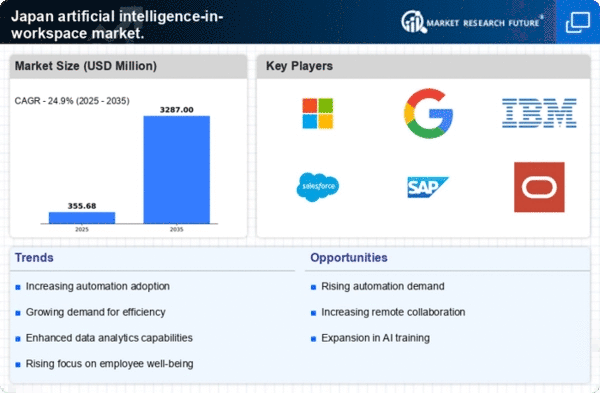Rising Demand for Efficiency
The artificial intelligence-in-workspace market in Japan is experiencing a notable surge in demand for efficiency across various sectors. Organizations are increasingly seeking solutions that streamline operations and enhance productivity. This trend is driven by the need to optimize workflows and reduce operational costs. According to recent data, companies that have integrated AI technologies report a productivity increase of up to 30%. This growing emphasis on efficiency is likely to propel the adoption of AI tools, as businesses aim to remain competitive in a rapidly evolving market. Thus, the artificial intelligence-in-workspace market is positioned to benefit from this rising demand, as firms invest in innovative solutions to meet their operational goals.
Increased Focus on Data Security
Data security concerns are becoming increasingly prominent in the artificial intelligence-in-workspace market in Japan. As organizations adopt AI technologies, they are also recognizing the importance of safeguarding sensitive information. This heightened focus on data protection is driving the demand for AI solutions that incorporate robust security measures. Companies are seeking AI tools that can detect anomalies, prevent data breaches, and ensure compliance with regulations. The market for AI-driven security solutions is expected to grow by 40% in the coming years, reflecting the urgent need for enhanced data protection. The artificial intelligence-in-workspace market is likely to evolve in response to these security challenges, as businesses prioritize the integrity of their data.
Technological Advancements in AI
Technological advancements play a crucial role in shaping the artificial intelligence-in-workspace market in Japan. Innovations in machine learning, natural language processing, and data analytics are enabling organizations to leverage AI in unprecedented ways. These advancements facilitate the development of sophisticated tools that can analyze vast amounts of data, automate routine tasks, and provide actionable insights. As a result, businesses are increasingly adopting AI solutions to enhance decision-making processes. The market is projected to grow at a CAGR of 25% over the next five years, driven by these technological innovations. The artificial intelligence-in-workspace market is thus likely to see a continuous influx of new technologies that enhance workplace efficiency and effectiveness.
Shift Towards Remote Work Solutions
The shift towards remote work is significantly influencing the artificial intelligence-in-workspace market in Japan. As organizations adapt to flexible work arrangements, there is a growing need for AI-driven tools that facilitate collaboration and communication among remote teams. This trend is prompting companies to invest in AI solutions that support virtual meetings, project management, and team coordination. Recent studies indicate that 70% of Japanese companies are exploring AI technologies to enhance remote work capabilities. This shift not only reflects changing workplace dynamics but also highlights the potential for AI to transform how teams operate in a distributed environment. The artificial intelligence-in-workspace market is thus likely to expand as businesses seek to optimize remote work experiences.
Government Initiatives Supporting AI Development
Government initiatives aimed at promoting AI development are significantly impacting the artificial intelligence-in-workspace market in Japan. The Japanese government has launched various programs to encourage research and investment in AI technologies. These initiatives include funding for AI startups, tax incentives for companies adopting AI solutions, and partnerships with academic institutions. Such support is fostering an environment conducive to innovation and growth within the artificial intelligence-in-workspace market. As a result, businesses are more inclined to invest in AI technologies, knowing that they have governmental backing. This trend is likely to accelerate the adoption of AI solutions across various industries, further solidifying Japan's position as a leader in AI innovation.
















